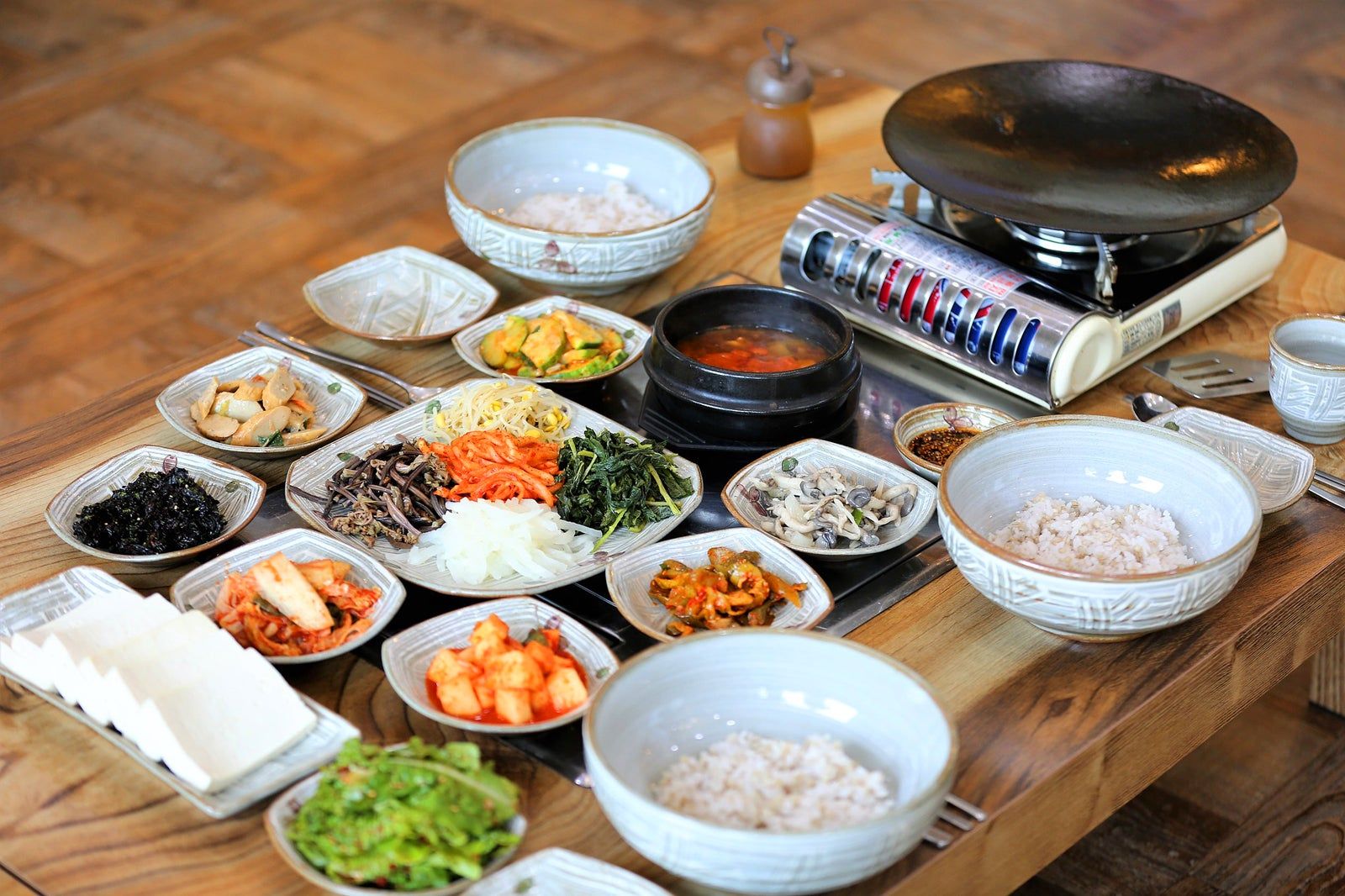10 Best Local Dishes from Gyeongju

10 Best Local Restaurants in Gyeongju
Where to Find Gyeongju’s Best Local Food?
Gyeongju is a city with delicious snacks and dishes that are part of its charm beyond its beautiful scenic spots, relics, and ruins from a thousand years ago. From early on, a wide range of menus was developed to meet the diverse tastes of travelers to this area.
In recent years, many unique restaurants that appeal to young visitors have filled the streets making the city an even more attractive go-to place. Look around the coastal city and try any nearby restaurant when you’re hungry. You’re sure to enjoy a satisfying meal every time. Check out the list below for where to eat around Gyeongju.
1. Palujeong Pavilion Hangover Soup Street
A nostalgic, comforting flavor
Good for: Budget, Food
Hangover Soup Street is a 50-year-old cluster of eateries located in the Palujeong Pavilion 3-way intersection in Hwango-dong, Gyeongju-si. There used to about 30 restaurants on the street, but nowadays it’s a place of memory for those who haven’t forgotten the taste of ‘grandmother’s hangover soup’ from their youth.
Hangover Soup (haejang-guk) is typically made with meat and bean sprouts, but here, it’s prepared using buckwheat jelly and bean sprouts as main ingredients along with gulfweed (mojaban), sour kimchi, and seafood broth. You’ll be amazed by the light yet savory taste of the broth. Most restaurants specialized in hangover soup, but they also serve ox blood soup (seonjitguk) and loach soup (chueo-tang).
Location: Gyeongju-si, Gyeongsangbuk-do, South Korea

Palujeong Pavilion Hangover Soup Street
2. Ssambap Street
Leaf wraps with a choice of fillings
Good for: Families, Food
The area near the Daereungwon Tomb Complex is home to many restaurants specializing in leaf wraps and rice (ssambap). You’ll love the scrumptious chewy Gyeongju rice wrapped with fresh organic vegetables, homemade red pepper paste, soybean paste, and salted fish. When you order a set menu with ssambap, you usually get 7 or 8 kinds of vegetables, ssamjang sauce, salted fish, meat, and generous side dishes.
Each restaurant boasts their own unique soybean sauce, and ssambap is served as different dishes by adding stir-fried pork (jeyuk), broiled short rib patties (tteok-galb), thinly sliced beef (bulgogi), or rich soybean paste stew (cheonggukjang) to the rice.
Location: Gyeongju-si, Gyeongsangbuk-do, South Korea

Ssambap Street
3. Samneung Noodle Soup Village
A filling treat after hiking the forests of Namsan
Good for: Adventure, Food, History
Samneung Noodle Soup Village is located near the Samneung Royal Tombs at the foot of Namsan. A long time ago, farmers who grew wheat nearby started to sell noodle soup (kalguksu) made with the wheat they harvested. Now there are several noodle soup restaurants, each with its own recipe, but all using local wheat and perilla seed powder. The dish also features anchovies, shrimp, kelp, and green onions to create a thick and savory broth.
Menus also include boiled beef or pork slices (suyuk), green onion pancake (pajeon), and acorn jelly (dotori muk). It is popular among hikers walking down from the Samneung pine forest trails or the peak of Namsan.
Location: Gyeongju-si, Gyeongsangbuk-do, South Korea

Samneung Noodle Soup Village
4. Hwasan Bulgogi Street
Juicy, charcoal-grilled beef
Good for: Couples, Food
Hwasan Bulgogi Street in Cheonbuk has restaurants that sell only Korean beef. Cheonbuk is about 20 minutes’ drive from Gyeongju Bomun Complex. Gyeongju has long been known as one of Korea’s 5 largest cattle markets, and it produces premium Korean beef under the name Gyeongju Millenium Hanwoo.
Hwasan Bulgogi Street goes back nearly 30 years, and the beef restaurants here have been serving fresh and savory beef dishes with quality vegetables ever since. Their charcoal-grilled beef ribs (sutbul galbi) are especially popular. Plenty of side dishes are also provided.
Location: Gyeongju-si, Gyeongsangbuk-do, South Korea

Hwasan Bulgogi Street
5. Bomunho Lake
Stunning lakeside views while you eat
Good for: Adventure, Families, Food, Luxury
The village around the Bomunho Lake Tourism Complex is home to many restaurants, offering a variety of dishes for travelers visiting nearby attractions. Popular regional dishes include Korean chicken, charcoal-grilled beef ribs (sutbul galbi), Korean table d’hote (han-jeongsik), spicy fish stew (maeun-tang), soft tofu (sundubu), and sliced raw sole (gajami hoe), all of which are enriched by the beautiful lakeside views.
There is a lot to see and do in this area, including the K Pop Museum, Gyeongju Luge World, and the Gyeongju World theme park, so there are plenty of opportunities to work up an appetite.
Location: Gyeongju-si, Gyeongsangbuk-do, South Korea

Bomunho Lake
6. Bukgun Soft Tofu
Your choice of soft tofu dishes
Good for: Budget, Food
Bukgun-dong on the north shore of Bomun Lake has many restaurants specializing in soft tofu (sundubu) dishes, a nourishing meal that all can enjoy. Since beans have been cultivated for a long time by farmers in this area, a variety of soybean dishes have been developed over the years.
Soft tofu stew (sundubu-jjigae) in earthenware pots taste spicy and rich since the recipe uses pure Korean beans. Adding raw eggs to the pot and allowing the stew to cook them is a unique and delicious experience. Each restaurant has its own signature dish, such as soft tofu stew with pine mushroom (songi sundubu) or soft tofu with marinated crabs (gejang sundubu), so there’s plenty to choose from.
Location: Gyeongju-si, Gyeongsangbuk-do, South Korea

Bukgun Soft Tofu
7. Freshwater fish stew
The best of local produce
Good for: Families, Food
Gyeongju has long been famous for its freshwater fish stew (minmul maeuntang). The city has several freshwater fish stew restaurants, thanks to its proximity to several rivers and lakes in the region. The stew can be made with catfish, king crab, mandarin fish, Chinese minnow, eel, crucian carp, or shrimp, so there’s a range of options for you to enjoy the spicy and savory flavors.
Freshwater fish stew is made by boiling freshly caught fish with sesame leaves, leeks, water parsley, mushrooms, and taro, all healthy, seasonal foods that will boost your energy levels. It also tastes great with homemade hand-pulled dough (sujebi).
Location: Gyeongju-si, Gyeongsangbuk-do, South Korea

Freshwater fish stew
8. Hwangridan-gil restaurants
Traditional neighborhood serving contemporary flavors
Good for: Food, History, Luxury, Photo
Hwangridan-gil is a go-to if you’re looking for restaurants and cafés with a refined atmosphere in Gyeongju. It’s a fashionable place for young people and has a lot of beautiful restaurants and atmospheric cafés in renovated hanok houses, great for taking some souvenir photos.
A variety of cuisine is on offer here, from Korean table d’hote (han-jeongsik) and Japanese fusion food to pizza, pasta, and homemade beer. You can also enjoy coffee, desserts, and ice cream in the cafés and bakeries. Don’t miss out exploring the many quaint alleys. They will take you to some of the best-hidden spots the city has to offer.
Location: South Korea, Gyeongsangbuk-do, Gyeongju-si, Hwangnam-dong, Poseok-ro, 일대

Hwangridan-gil restaurants
9. Gyeongju Eupseong Fortress Cafes
A romantic area full of cozy spots to dine in
Good for: Couples, Food, Photo
Gyeongju Eupseong Fortress, located in Bukbu-dong, Gyeongju, is said to have been built during the Goryeo period, over 1,000 years ago. The once-damaged fortress has been repaired through restoration projects, and the alleys around it are now filled with romantic cafés and restaurants to attract young couples looking for a cozy place to dine and hang out.
You can enjoy their signature dishes and beverages with views of the fortress in view, which looks particularly amazing in the evening. There are plenty of trendy brunch spots too, so no matter what time of day you’re in the area you’ll find something tasty to tuck into.
Location: Gyeongju-si, Gyeongsangbuk-do, South Korea

Gyeongju Eupseong Fortress Cafes
10. Hwangnam-dong bakeries
A sweet treat to finish on
Good for: Couples, Food, Shoppers
Hwangnam bread is a must-try and can be a lovely gift from a trip to Gyeongju. You can find bakeries everywhere, but there several clustered around Daereungwon Tomb Complex and Hwangridan-gil. There are various baked goods available including Hwangnam bread (hwangnam-ppang), glutinous barley bread (chalbori-ppang), and Juryeonggu bread (Juryeonggu-ppang).
Hwangnam bread, also known as Gyeongju bread, is a round pastry with a filling of red bean paste, and glutinous barley bread consists of 2 pancakes made with glutinous barley flour wrapped around a filling of red bean paste. Make sure you try these scrumptious snacks.
Location: Gyeongju-si, Gyeongsangbuk-do, South Korea

Hwangnam-dong bakeries
This article includes opinions of the Go Guides editorial team. Hotels.com compensates authors for their writing appearing on this site; such compensation may include travel and other costs.